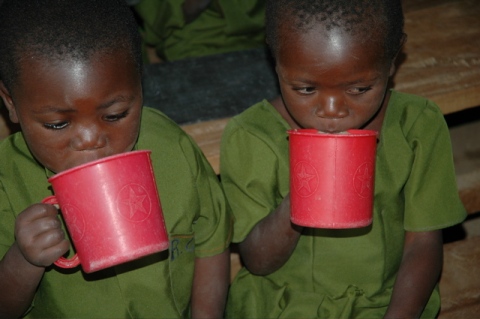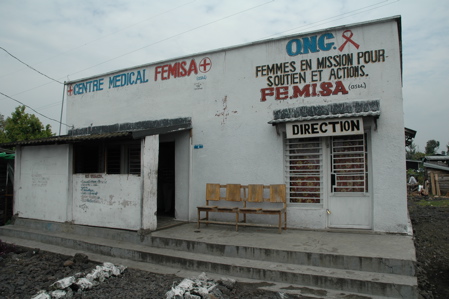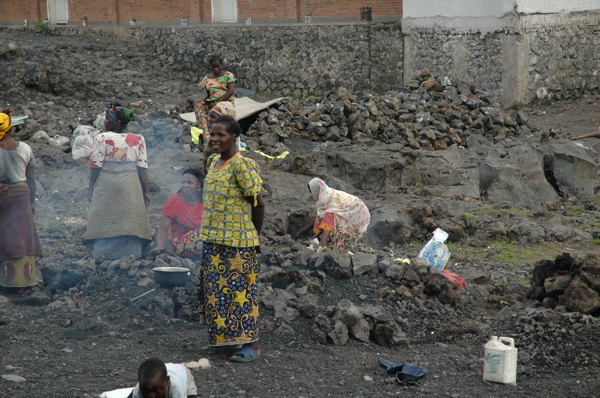
Ambassador Melanne Verveer opened Thursday's phone conference about Secretary of State Hillary Clinton's visit to eastern Congo with a statement about the "ongoing use of rape as a tool of war in the conflict" and the "toll it is taking on the civilian population there." Verveer made it clear that Clinton raised this issue forcefully with President Joseph Kabila when they met in Goma, and then outlined an encounter with rape victims at Mugunga I IDP camp which was "highly emotional" and "unspeakable because of the kinds of brutality and atrocities women had endured." As reported earlier, this encounter had included accounts of babies cut from wombs with razor blades, and rapes with rifles.
Verveer said Clinton also met with MONUC (the UN peacekeeping force) to "get their assessment of the situation." Then she threw it open to questions about specifics regarding Clinton's historic visit (my words) as the first Secretary of State to visit Congo. The stage had been finally and mercifully set for an in depth discussion with the press about gender-based violence and the implementation of the $17 million Clinton pledged to help women and children who have been driven from their villages and homes by rapes, burnings and other atrocities committed by the Congolese army (FARDC), Rwandan rebel forces (FDLR), the Rwandan army--and the role of conflict minerals in this disaster.
Unfortunately, and sadly, the first question was squandered. We had a half an hour to discuss issues that have been afflicting Congo for over one hundred years, with over six million dead in the last decade.
Barry Schweid, who regularly covers international issues for the Associated Press, got the ball rolling, and if it had not been a phone conference I would have spoken with him afterwards about his question. Schweid brought up Secretary Clinton's testy response to a Congolese student in a town hall meeting in Kinshasa. Clinton's twenty second encounter has been used ad infinitum by the international media as a tool of ridicule and a smarmy sideshow that does not serve the women and children of Congo who have been brutalized, humiliated, persecuted, and ignored.
Schweid: "Does her, I think you will admit, super sensitive response reflect the way women have been disadvantaged all of these years? How much of that reflects do you think women's issues and women's rights?"
Huh? Why in god's name was he bringing this up? The clock was ticking on the conference. "Women's rights" is a non sequitur in Congo. Maybe it was because he is a guy. Guys just don't get it.
Admittedly weary from a grueling trip, Verveer deftly handled the question and moved the discussion forward.
Well, I don't really want to get into that. I think it was -- there was much ado about very little in terms of what I understand the coverage of that was back here.
This whole question, I think, was a -- very much a side event, and I don't want to underscore it any further in terms of the kind of psychobabble, in my view, that has been read into it.
I Googled Schweid, and incredibly, after the conference call wrapped (I have no idea how long he hung around), he spent many column inches on this non-issue, while the Congolese remain literally begging for mercy.
What gives?
Verveer seemed genuinely pained by the AP reporter's question and spoke of Congolese students with "great aspirations," "the heart" it took for them to discuss important issues in public, and the fact that the international media has not explored the depth of Clinton's visit and the concerns of the Congolese who interacted with her.
Score one for Verveer.
I had no idea I was up next and had been nursing a question for days about how, exactly, we plan to monitor the $17 million Clinton promised. NGO fraud is a huge issue in a country where bribery, graft, intimidation and nepotism is the rule rather than the exception. There are many statistics, but a rule of thumb is that in Congo only 30 percent of donations reach the ground. Of that 30 percent, perhaps half of that reaches the intended recipients. Recently I had heard something that truly made my stomach turn. A former rape counselor wrote to me about a rape program managed by an international NGO based in Bukavu. $2000 US was given to a village. $1800 of that figure was "used up" by the NGO for "supervision" of the program. Do the math. That left $200 which was further depleted by fees the "supervision" team used for food and lodging. Maybe $20 went to the victims. This is a heartbreaking issue in Congo.

Image: One meal a day of gruel © Nienaber
In a "roundtable" Clinton attended with NGO's and activists in Congo that was also not covered by the press, an unidentified speaker had this to offer about NGOs squandering their existence.
Another problem we are having that we need to address today is the presence of this many UN staff and international NGOs. Their presence has caused the cost of life to go very high all over the country, and specifically here, in Eastern Congo. We are having problem -- local people having problem -- to even find comfortable housing, affordable housing, because ex-pat have the cash and locals don't have the cash.
We are asking that Resolution 1820 (to make the United Nations more sensitive to the issue of sexual violence) be enforced. We are asking, as well, that the rule of the international community and the UN be redefined, because if they cannot protect our women and our children, I don't see why they should stay here.

Image: I have witnessed this excess. One look around the NGO "Go Store" in Goma gives us taxpayers a pretty good idea where out tax dollars are going in terms of foreign aid to the administrators. You can purchase disco balls and sound systems there also for NGO and embassy parties.© Nienaber
So, I asked the question. How will we manage the money and be accountable? Verveer seemed relieved to be back on track.
"This question has been raised with us as well," she said, mentioning Panzi hospital and Heal Africa, who have requested training for local surgeons for fistula and other very complicated rape-related repairs as examples of "extraordinary needs."
We are aware that there has been some disappointment and speculation about the fact that the resources may not have heretofore in the numbers that have been set out directly (gone) to the folks on the ground, and we are making sure that in terms of the new amounts that have been announced by the Secretary that they will go exactly for the needs that have been set forward.
But as you know there is an ongoing look at how we spend our development dollars and how much goes to contractors and how much goes to the recipients and that is part of a much bigger issue...but you have touched on a very specific local application of a bigger challenge.
Not wanting to hog the time with an immediate follow up, I laid low, but I really wanted to delve deeper. Even though millions may be spent on fistula operations and other necessary surgeries to repair reproductive and urinary systems that have been savaged, what good does this do if the women have no place to go but the camps and the violence continues?
Will we have a version of "rationed" health care in DRC where the most damaged bodies are rightly cared for and then recycled back through triage at Panzi and Heal Africa because atrocity is self-perpetuating? Why train surgeons when what is needed is training for midwives and perhaps more money for the woman police force that is being discussed?

Image: Goma Community Health Center for Women and Children © Nienaber
Professionals in Congo are rightly concerned that the foreign "health care system" of the huge hospitals will spend more time training surgeons instead of basic family care for physicians. It is the same mistake we made here in the States, and what a fine mess we have made of things.
 © Nienaber
© Nienaber
The next question came from a woman interested in conflict minerals. It was a good question. Profits from the mines are flowing to armed groups. What were we going to do about this?
Verveer, by her response, indicated that Clinton was on top of this issue also. There is "no accountability, no transparency, and that really needs to be set in place," she said. Profiteering by armed groups has to stop.
The Ambassador said that the world needs to take steps to help DRC regulate the mineral trade to make sure these profits are not going to armed groups. "There is legislation in Congress in terms of how US companies should ensure that the products they trade in are not benefiting from the trade in conflict minerals.
"There will be more to be discussed in coming months," she said.
I hope it gets covered.
And so the discussion must continue. It cannot be allowed to fade from the current news cycle. If so, we writers and photographers who have the ability to forcefully get the plight of the Congolese across to the American public will and should be held accountable for not engaging in what might very well be the biggest moral crisis of our life time. We will be like Stakeholders who only have an interest in what they can pilfer from Congo.
A Congolese woman at the NGO roundtable in Congo put it eloquently.
I would like to talk about the self-congratulations of certain agencies. And I think that the obligation to protect is the obligation of international law. So that should be the first role of the United Nations.
Today -- and I am talking as someone who had come to her province, to her country after 20 years of war -- we know, we really know, the stakes. We have received many, many visitors, each more important than the one before. We have received many, many celebrities, too. At the end, we have the impression that people only came to consume human poverty, human misery. And, in the end, all that we got was a pile of business cards.
Will we be guilty of leaving our business cards at the press and independent media conferences, ignoring humanity at our peril? Will we stockpile blogs and articles that have no follow-up and no real analysis for our self-serving resumes? Will the press continue to interview the press on cable news? Are we all nothing more than the celebrities who come and go while the real heroes suffer?
The Congolese woman asked Clinton to look around the room.
So, you see around this room -- That means, you know, the posters here. Women are more precious resources, but we look to the Congo for mineral resources, forgetting that our first more important resource is the woman. Woman is who gives life, the life that we're destroying here.
Are we no better than hyenas gathering for the kill as we continually consume human misery?
I was trained in the old school of journalism where we are not supposed to get involved in the story. I think the rules have loosened enough that if anyone wants to know, there is a competent local organization of midwives in Goma who only need $100,000 to make great things happen. Seven women per day can be saved. It is something. If someone on Ambassador Verveer's staff sees this, please get in touch.
